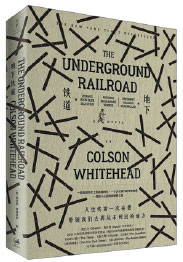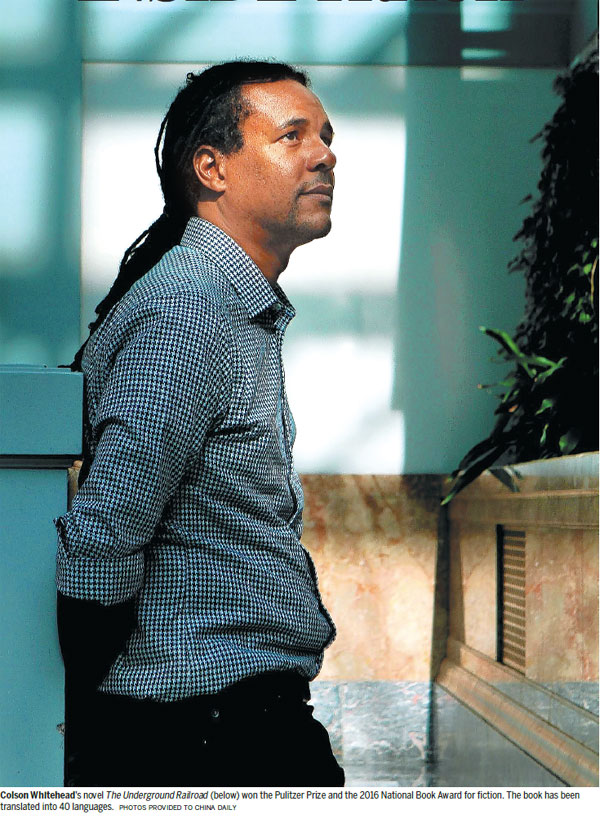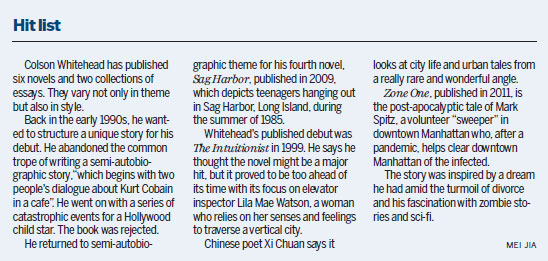Finding The Inside Track
Colson Whitehead explains how New York, post-traumatic stress and a long gestation helped shape his latest award-winning novel. Mei Jia reports.
Colson Whitehead, this year's winner of the Pulitzer Prize for fiction, who is on his first book tour in China, says he finds Beijing's roads too broad to make walking around enjoyable, but Shanghai, like New York where he grew up, is an incredible place to walk around.
"I love cities. They're fascinating," he tells China Daily at the hotel where he is staying in Beijing, a few hours before he joins poet Xi Chuan for a talk on the theme of cities.

"A city is sort of a calendar," Whitehead, 47, says. They chronicle their residents' lives and emotional history by, for example, "mapping a nice meal in Manhattan, or the corner where I broke up with my ex".
For his novel The Underground Railroad, which has won multiple awards since it was published last year, Whitehead wanted to weave his hometown New York into the book, which was not that easy since it is set in the 1850s and tells the tale of Cora, a slave who makes a bid for freedom from the Georgia plantations using the underground railroad.
"I managed it with the main villain, Ridgeway. He is from New York," he says.
The novel is his sixth, and, in his words, it has had "quite a year". It was a New York Times best-seller, won the Pulitzer and the 2016 National Book Award for fiction, and it has been translated into 40 languages. The Chinese version was published in 2017.
It also got recommendations from Barack Obama and Oprah Winfrey.

The New York Times said he "told a story essential to our understanding of the American past and the American present".
And the Pulitzer committee gave the book the award for its "smart melding of realism and allegory that combines the violence of slavery and the drama of escape in a myth that speaks to contemporary America".
The Underground Railroad refers to a network of secret routes established during the early-to-mid 19th century to help the African-American slaves escape to the northern states or Canada.
Whitehead first conceived the idea of the book some 17 years ago, but he waited until he was finally ready to begin writing it.
Whitehead spent a long time doing research for his skillfully structured story. He read the 2,300 first-person accounts of slavery collected by the Federal Writers' Project in the 1930s, visited a historical plantation site in Louisiana and re-read classics such as Toni Morrison's Beloved.
"There's always a writer that is smarter than you and has done the writing you wanted," he says.
His response is always to write something that speaks to him.
"I was going to have to write about life on a plantation, my impressions of how people react in such situations," he says. "That meant I couldn't write a plantation scene that didn't incorporate what we know as trauma, the experiences of people who have survived genocidal violence such as the Holocaust."
Writing a book in 2015, there was a plenty of material available on post-traumatic stress, and how a person's psychology is deformed by incredibly brutal experiences.
Although Cora, the main character of the book, stands out as being brave and able to act, Whitehead depicts some of his other slave characters in a lesser light, they gossip and abuse their fellow sufferers.
The book's translator Kang Kai says the more "human" characters are one of the book's attractions.
Liang Hong, a literary critic from Renmin University praises the book for being "well structured and told, revealing a multifaceted history".
Whitehead was born in New York in 1969. He grew up in Manhattan to a well-off family and graduated with a BA from Harvard University's English department in 1991.
He was an avid reader from childhood and his years at Harvard strengthened the literary influences of James Joyce and Thomas Pynchon. He started out as a journalist at the Village Voice, where he found some space for writing fiction.
But although his work has now been recognized with many awards, he has had his own struggle to get where he is now. His first draft for a novel was rejected by 25 publishers and he finally dropped the idea, and his parents repeatedly urged him to "get a real job" until his first novel was published.
"I've been writing for 20 years. And I have books that didn't sell copies," he says.
But writing offers him the most joy, and he's now enjoying his days of writing, traveling and occasional teaching.
His next book is set in Florida in the 1960s, and he is taking his time to finish it.
"Sometimes I'll take a nap and then write a page, and then take another nap and finish another page," he says.
"My daughter once asked if I had a job, and I replied we have food to eat so I'm working."
Cooking is his only hobby besides writing. His first cookbook was about Sichuan food, which a friend's mother brought back from China in the 1980s.
"It's nice to finally have the original version since I'm here in China," he says.
Contact the writer at meijia@chinadaily.com.cn


(China Daily USA 08/04/2017 page13)
















